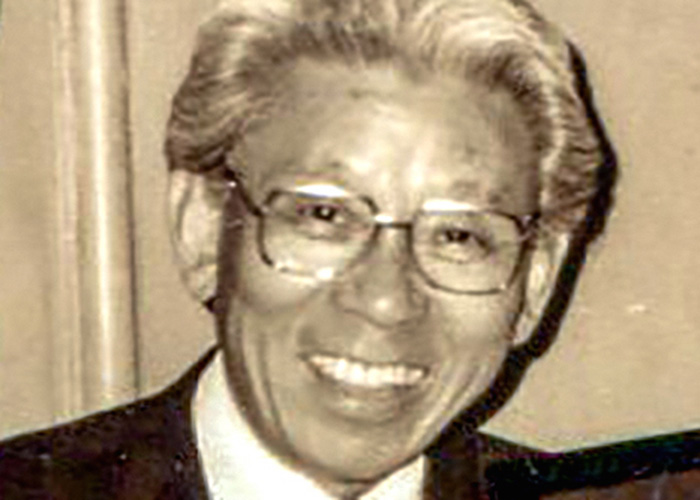In 2012 the Japanese government awarded Banjiro Uemura the Order of the Rising Sun for his contribution to the development of Japan’s TV industry and international relations.
It took Uemura 51 years to be recognized as a TV pioneer in his own country and now, at 88 years old, he’s been designated as a VideoAge International TV Distribution Hall of Fame honoree.
The Japanese fourth class (out of eight) prize, a Gold Rays with Rosette, was awarded to Uemura for founding in 1986 Star Channel, Japan’s first pay-TV service, as a joint venture with MGM, Paramount and Universal, and for launching in 1989 Super!, a foreign-import TV drama channel. Emperor Akihito presented the Award to Uemura at a ceremony at the Imperial Palace.
But in the international TV arena, Uemura is known, admired and respected since 1961 as the founder of Tohokushinsha Film Corporation (TFC).
Larry Gershman recalled: “I was very fortunate to have met Banjiro on my first trip to Japan [in 1976 as the head of Viacom International TV distribution]. Then, it was not easy to sell American productions to Japanese broadcasters, but Banjiro had the unique ability to act as a creative ‘bridge’: a way to find common ground for specific productions that could perform well on Japanese television.”
Stern and reserved while in his Tokyo home office, Uemura would show a humorous flair and informal manners while dealing with Western partners, suppliers and friends. Indeed, he took pride in being called in the U.S.-style “Banji,” just as an American named Robert would like to be called, “Rob.”
“He’s a man with humor and he likes telling jokes,” recalled Armando Nuñez Sr., who met Uemura in 1966 when he joined ITC and TFC was representing ITC, Paramount and Four Stars in Japan.
Though proud of his Japanese heritage, “Banji” has always been attracted by Western culture, especially American. He learned to speak English with an American accent while managing a bar, a PX (a store operated by the U.S. Army) in Tokyo and selling jewelry to U.S. soldiers, and took every opportunity to go to the movies to watch American films.
From the Americans, he learned to smile and tell jokes in public. But once back in Japan, “Banji” would immediately revert to Uemura-san. Looking at his photos taken in Japan and at various international TV markets, the difference could not be more striking: very serious in the former, jovial in the latter.
One aspect of the American lifestyle he did not acquire is the propensity for press coverage and, indeed, today very little can be found about him online. Like many Japanese, he possibly followed the Asian proverb, “the stake that sticks out gets hammered down (deru kui wa utareru).” After meeting him for the first time at the L.A. Screenings of 1990, the first interview that Uemura gave this writer was in the fall of the same year, and he even sent his driver to pick him up at Tokyo’s Narita Airport. The report appeared in the January 1991 issue of VideoAge.
This overdue Hall of Fame report was compiled thanks in part to the efforts of TFC’s executives over a five-month period.
Uemura doesn’t remember exactly when he first attended an international TV market, but “it was MIP-TV in the early 1970s,” he said, while the most recent was the L.A. Screenings in 2004.
Nuñez Sr. remembered one particular instance when, “one day at MIP-TV in 1980 at the Carlton Hotel terrace restaurant in Cannes, we were having lunch at separate tables, when Banji rushed to my table and with his fingers, picked up one of the asparagus from my plate!”
However, when the time came to name his first company, Uemura didn’t choose an American term, but settled for Tohokusha, where “Tohoku” was the rather remote Northeastern region of Japan where he originated, and “sha” stood for “company.”
In Japan, Tohoku is famous for its Nebuta Festival, a summer event with floats, costumes and music that attracts over 3 million people annually.
Uemura left Tohoku for Tokyo during World War II, when students were mobilized to work at factories. He was involved in production of parts for Zero Fighter planes.
Later on, when Uemura formed a new company in 1961 at age 32, it became the current Tohokushinsha by combining the words “Tohoku” (East-North), “shin” (new) and “sha company.”
TFC was originally created as a dubbing house for foreign TV series and feature films for Japanese TV, considering that during the ’60s and ’70s, 70 percent of TV shows on Japanese television were American.
Recalled Bruce Gordon, then at Desilu Studios in Sydney (before it was acquired by Paramount): “When I first went to Tokyo to sell programs and needed a dubber, I inquired from each of the TV networks and Banjiro was the most reliable, so I made a deal for him to dub our pilots.”
Today, 56 years later, TFC is a public company, quoted on the JASDAQ exchange since 2002, with revenues in 2016 of 59.9 billion Yen (U.S.$510 million). TFC has 1,582 employees and operates in advertising and content production (film and television), post-production, media (11 TV channels under nine brands), dubbing and subtitling, TV content distribution, property and retail business, all grouped under five divisions. Since 1996, TFC also owns Kimura Brewery, which produces premium sake and is the pride of Tetsu Uemura, Banji’s son and now TFC’s president and CEO.
TFC’s expansion into the retail business offers another insight into Uemura’s vision. In 1972 a Western-style supermarket in Tokyo got his attention and he bought it because he saw in it, as he recalled, “an atmosphere of American culture that influenced me when I was PX manager.” It also helped that “the supermarket was located in a super-prime piece of commercial real estate,” he added.
But Uemura also showed his pride in Japanese culture. In 1980, he was a co-producer of the landmark miniseries Shogun with Paramount Pictures, TV Asahi and Toho. Bruce Gordon, then-president of Paramount TV International, approached him regarding the project and Arthur Barron, then-president of Paramount Communications Entertainment Group, worked on the financial side of the project with Uemura.
“Financially, we didn’t make a profit, but I take pride in having worked on the project to ensure that Japanese culture was faithfully portrayed on screen. This was probably the first and last time that a Japanese drama was presented in this manner,” he said.
He recalled that another highlight in his career was a sale of ITC’s puppet series Thunderbirds to NHK in 1966. “I received an offer of U.S.$6,700 per episode from NHK,” he said, “and when I reported the sum to [ITC TV boss] Abe Mandell in New York on the phone, he yelled, ‘Are you crazy?,’ thinking that the sum was for the entire series. When he understood it was for each episode, I literally heard him and others in the office shout in Japanese ‘Banzai, Banjiro!’” TFC still handles all rights to this evergreen series as well as its reboot called Thunderbirds Are Go.
Uemura started in the entertainment business as a musician and he recalled, “at one time I supervised dubbing and directed commercials.” He added: “My father was a novelist and my mother came from a merchant family. I inherited one-half from each parent — art and a business sense. I am grateful to my parents.”
His son Tetsu, who started at TFC in 1988 and became president 22 years later, also has reason to be grateful to Banji, but with a twist. The younger Uemura recalled when he was 13 years old in 1975, his mother and father took him to their friend, Bruce Gordon in Sydney, Australia, “and left me there for … six years!” Recalled Gordon: “Of course he had a good Aussie accent!”
But, perhaps to make sure the young Uemura would speak perfect “American,” his father also sent him first to New York City and, later, to attend Occidental College, a private, co-educational liberal arts college located in the Eagle Rock neighborhood of Los Angeles (which former U.S. president Barack Obama attended shortly).
The older Uemura and his wife Hisako also have two daughters, Satsuki and Ryo, and TFC’s shares are divided between Tetsu (18.5 percent), Banjiro (16.9 percent) and the rest are floating on the market.
Banjiro’s fondness for America brought him first to open an office in New York City in 1973 and in 1983, in Los Angeles, where TFC still maintains its content acquisition base on Sunset Boulevard.
Nuñez Sr. added, “Banji used to have an apartment in New York City and every time he visited the ITC office he’d go to a nearby restaurant on 57th Street and Park Avenue to have his favorite dish: littleneck clams.” The Uemuras sold the apartment when TFC closed its New York City offices in 1983.
And, recalled Joe Lucas, “During the L.A. Screenings in 1991, we at Paramount organized a barbecue party at my house in Tarzana. Bruce Gordon bought some Australian sausages and, as a general surprise Banjiro went to the grill and started to cook and serve them.”
Of all the U.S. television executives Uemura befriended, he considers Manny Reiner his mentor. The two met in the early ’70s when Reiner was running Four Stars’ international sales. He retained Manny’s widow, Elaine, as a consultant until her passing, and now Tetsu maintains both a personal and business relationship with their nephew, Gordon Rubenstein, managing partner of Raine Ventures.
Uemura also fondly related some of his accomplishments with his American partners. TFC launched Japan’s first pay-TV service, Star Channel, as a joint venture with Paramount, Universal and MGM. He then explained the rationale behind the creation of Super! Drama TV. “As Japanese terrestrial networks lost enthusiasm for foreign dramas in the late ’80s, TFC started Super! Drama TV, a basic TV channel based on foreign series, in order to provide an alternate home for foreign producers.”
When in 1978 he became the chairman of Japan Audio Producers’ Association, Uemura established an industry rule that the ownership of dubbed tracks resides with a producer of the show, not the station who paid for the dubbing.
He also served as chairman of Japan Satellite Broadcasting Association for three terms of two years each, starting in 2004, and assisted the Ministry of Internal Affairs and Communications’ initiative to drive multi-channel broadcasting in the country.
Of all his achievements, perhaps the biggest challenge for Uemura was presented in 1978, when he co-produced Message From Space, a theatrical film, which at the equivalent of U.S.$6 million, was the most expensive film of the era in Japan.
Uemura likes to say that “Tohokushinsha is involved in the business which cannot be mass-produced — whether it is dubbing, feature-TV production or TV commercials. Each is handcrafted, a work of art.” Similarly, the younger Uemura would explain that the sake of “the Kimura family [which] is distantly related to my family, is a small brewery with a history of 400 years that produces the premium sake by hand in a small quantity following the traditional technique.” It became a TFC group company 21 years ago.
Because of this sense of uniqueness, in 1995 Uemura Sr. set up the Visual Techno-Academy in Tokyo, a media education institution “where youth can study toward making their dreams of creativity and passion come true.”
He retired as TFC chairman and CEO in 2010.
(By Dom Serafini)
Audio Version (a DV Works service)











Leave A Comment